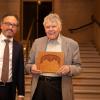
Jan Shrem, whose philanthropy was gratefully and frequently acknowledged in the San Francisco Bay Area and beyond, otherwise guarded his privacy. When he died in September at age 94, news wasn’t released until the end of October; the date and cause of his death are not known.
Unlike some other successful entrepreneurs and philanthropists, Shrem kept information about his wealth private. His was a life that sounds like a picaresque adventure novel full of world-girdling journeys.

Jan (pronounced “Yawn”) Isaac Shrem was born in 1930 in Colombia to Lebanese Jewish parents, who after his birth moved to Jerusalem, where Shrem grew up. The 5,000-year-old city was then the administrative capital of Mandatory Palestine. As World War II was ending, Shrem’s parents sent their 16-year-old son to New York to live with an aunt.
After high school, he moved to California and enrolled at UCLA to study architecture, but instead of graduating, he departed for Japan. There, he sold English-language books, starting as a door-to-door salesman and soon becoming a businessman with 50 offices and 2,000 sales representatives.
In Japan, Shrem also married his first wife, Mitsuko, his partner for five decades until her death in 2010. The couple moved to France, where Shrem studied winemaking and began collecting art, two interests that would later come together in his founding of Clos Pegase, a winery on 50 acres that he bought in Calistoga in Napa County.
The site eventually became an architecturally dazzling “temple of wine” spread over 450 acres, sporting an underground theater and concert hall and exhibiting in rotation 350 artworks purchased by Shrem. He sold Clos Pegase in 2013.
Shrem’s philanthropy expanded exponentially after his marriage to Maria Manetti Farrow on Valentine’s Day 2012 at San Francisco City Hall. The Italian-born businesswoman was already a patron of the Metropolitan Opera, the San Francisco Symphony, and San Francisco Opera, but the couple together did much more.
Several major projects funded by the Shrems were centered at UC Davis, where the couple donated to the Mondavi Center, funded arts education in the College of Letters and Science, and helped to establish The California Studio: Manetti Shrem Artist Residencies and the Jan Shrem and Maria Manetti Shrem Museum of Art.
Shrem said at the museum’s inauguration in 2016: “Our philosophy of giving rests on simple concepts. We believe that education and the arts should be accessible to all people and that a curious, open mind should be nurtured and supported.”

In May, Manetti Shrem pledged more than $20 million for what’s being envisioned as an “arts renaissance” at UC Davis. The donation is expected to fund eight new endowments and programs in art, art history, and sustainable design.
“Maria and Jan’s generosity has been nothing short of transformational at UC Davis,” said Shaun B. Keister, the university’s vice chancellor for development and alumni relations. “Jan’s memory will live on as a beacon of philanthropy in action, one which will profoundly influence future artists and inspire all students, no matter their field of study.”
The couple’s projects have supported education, the arts, music, medicine, and aid for people in need, spanning more than 55 charitable programs across the United States, Italy, the United Kingdom, Africa, Mexico, and France.
Locally, the Shrems donated to, among others, SF Opera, SF Symphony, Festival Napa Valley, KQED, Cal Performances, SFFILM, SFMOMA, Fine Arts Museums of San Francisco, UC San Francisco (establishing the Jan Shrem and Maria Manetti Shrem Neurology Clinic), and Sutter Health California Pacific Medical Center.




